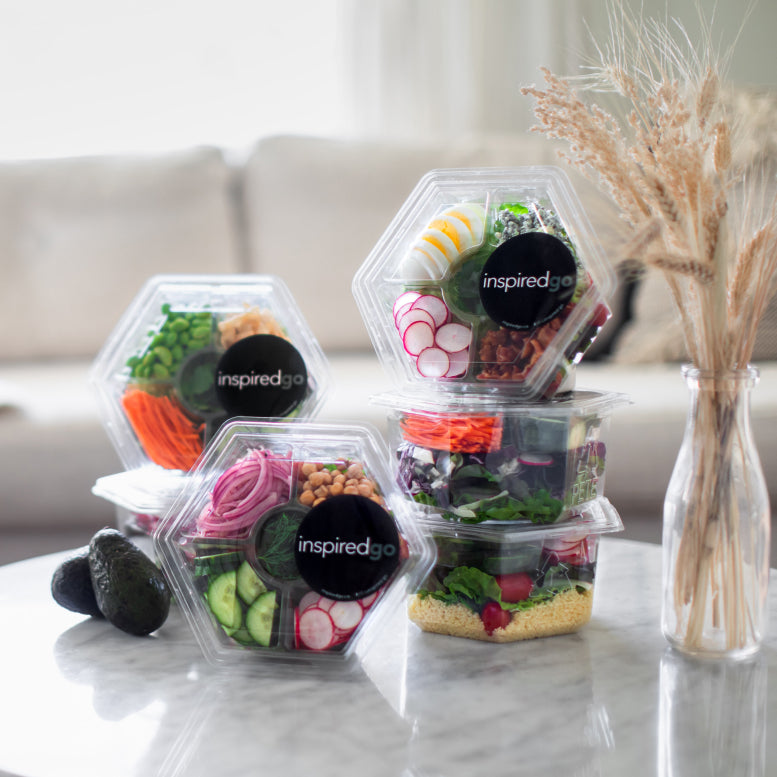What Makes A Salad Keto Approved
Table of Contents
1. Understanding Keto-Approved Salads
2. How Many Carbs Are in a Typical Keto Salad?
3. Are Keto Salads Nutritionally Balanced?
4. How Does Inspired Go Fit Into a Keto Diet Plan?
1. Understanding Keto-Approved Salads
A salad becomes keto-approved when it aligns with the nutritional guidelines of the ketogenic diet, a high-fat, low-carb eating plan. This diet emphasizes consuming healthy fats and protein while drastically reducing carbohydrate intake, so a typical keto salad would include a generous portion of protein like grilled chicken or salmon, a variety of non-starchy vegetables such as leafy greens, cucumber, and bell peppers, and a hearty serving of healthy fats like avocado, olives, and a high-fat dressing. It's important to avoid ingredients that are high in carbs, such as croutons, certain fruits, and sugar-laden dressings. A keto-approved salad, therefore, is one that is high in fats, moderate in protein, and low in carbohydrates, and it can be a tasty, satisfying way to meet your dietary goals while enjoying a variety of nutrient-rich foods.
Order fresh salads today →


2. How Many Carbs Are in a Typical Keto Salad?
The carbohydrate content of a keto salad varies depending on ingredients and portion size, but most are designed to stay under 10–15 grams of net carbs per serving. A salad built on leafy greens with proteins like chicken, paired with high-fat toppings like avocado, nuts, and cheese, typically contains minimal carbohydrates. Choosing low-carb dressings, such as vinaigrettes made with olive oil or sugar-free creamy blends, helps keep the meal keto-compliant. Pre-portioned keto salads from delivery services make it easy to stay within carb limits without constant tracking or weighing of ingredients. Nutritional labels provide transparency, giving you confidence that your salad supports your ketogenic goals. This makes keto salads a convenient, satisfying choice for anyone seeking to manage carbs while enjoying fresh, flavorful meals.
Choose your salads and schedule delivery →
3. Are Keto Salads Nutritionally Balanced?
Keto salads are carefully designed to provide more than just low carbohydrates, they offer a full spectrum of essential nutrients for overall health. Leafy greens deliver vitamins A, C, and K, while proteins like grilled chicken provide amino acids for muscle maintenance. Healthy fats from avocados, olives, nuts, and cheese supply sustained energy, support brain function, and help absorb fat-soluble vitamins. Keto salads also include fiber-rich vegetables that aid digestion and keep you feeling satisfied. Meal delivery services that specialize in salads craft keto-friendly options under the guidance of dietitians, ensuring every meal meets macronutrient needs without unnecessary additives or sugars. This makes keto salads a practical choice for balanced eating, supporting both short-term energy and long-term wellness.
Get fresh salads and snacks delivered →
4. How Does Inspired Go Fit Into a Keto Diet Plan?
Following a ketogenic diet is all about maintaining low-carb, high-fat, and moderate protein intake—and Inspired Go’s keto salads are crafted to make this balance effortless. Each salad is built with diet-friendly ingredients like leafy greens, quality proteins, healthy fats from avocado or seeds, and sugar-free dressings, all carefully portioned to keep net carbs in check. With transparent macronutrient labeling on every meal, you can easily track your daily carb limits without the stress of planning or prepping food yourself. Delivered fresh and ready to enjoy, our keto salads support a structured diet approach while giving you flavorful meals that help you stay in ketosis day after day. With Inspired Go, sticking to your keto plan becomes simple, reliable, and full of variety, making long-term success easier to achieve.
Try our fresh, ready-to-eat salads →
Frequently Asked Questions
The most nutritious salad greens are dark leafy varieties like spinach, kale, and arugula. These greens are packed with essential vitamins, including A, C, and K, as well as minerals like calcium and iron. Kale is particularly rich in antioxidants, while spinach offers significant amounts of folate and magnesium. Choosing a mix of dark greens enhances both the flavor and nutritional value of your salad.
A healthy salad includes a balance of nutrient-dense ingredients like leafy greens, fresh vegetables, lean proteins, and healthy fats. For example, a base of spinach and kale, paired with grilled chicken, cherry tomatoes, avocado, and a light olive oil dressing, creates a wholesome meal. Avoid fried toppings or sugary dressings, as they add empty calories, and opt for natural ingredients to maximize nutrition.
Yes, eating salad daily is a healthy habit when it includes a variety of fresh, nutrient-rich ingredients. Salads offer fiber for digestion, antioxidants for immunity, and essential nutrients like potassium and folate. Regularly eating salads can support weight management and improve energy levels. To avoid monotony, vary your greens, proteins, and toppings to keep meals satisfying and nutritionally balanced.
Healthy salad dressings are typically made with simple, natural ingredients. Olive oil-based dressings, paired with balsamic vinegar or fresh lemon juice, provide healthy fats and enhance flavor without unnecessary calories. Avoid store-bought dressings with high sugar or preservatives. For a creamy alternative, opt for homemade dressings using Greek yogurt or avocado for added nutritional benefits.
Yes, salads are incredibly beneficial for overall health when prepared with fresh, whole ingredients. They are low in calories and high in vitamins, minerals, and antioxidants, supporting heart health, digestion, and immunity. Adding a mix of proteins and healthy fats creates a satisfying, nutrient-dense meal. Regularly incorporating salads into your diet can promote long-term well-being and energy.

